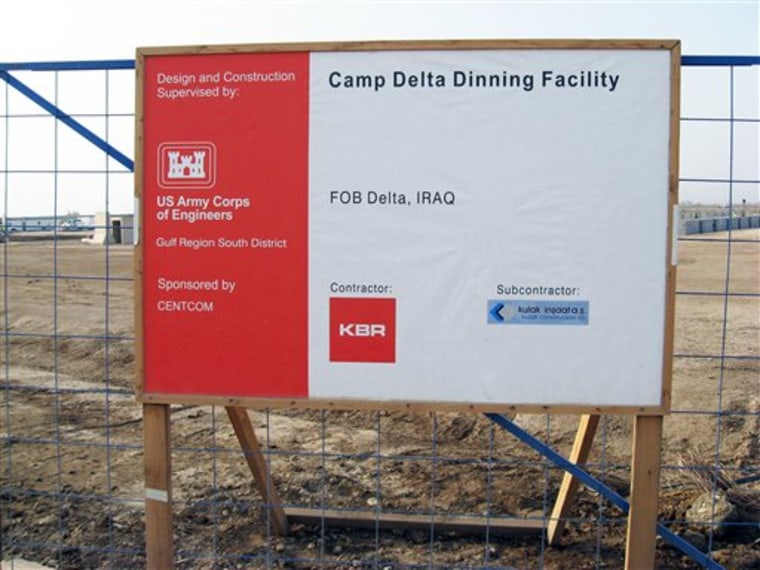The sign outside a $30 million construction project under way at a U.S. military base in Iraq says it all: "Camp Delta Dinning Facility."
The spelling error seems appropriate for a project that critics say should not have been started and now is too far along to stop, a symbol of the waste and inefficiency that has dogged U.S. efforts in Iraq and Afghanistan.
At a congressional hearing Wednesday, an independent panel examining tens of billions of dollars in wartime spending blamed poor management and outdated paperwork for the mess hall, no longer needed as U.S. troops are leaving Iraq.
All ongoing or planned construction work for U.S. forces in Iraq should be carefully reviewed by military leaders to ensure unnecessary projects are shut down, the Wartime Contracting Commission said in its first report to Congress since being created last year.
Oversight needed
They also warned more vigorous oversight is needed to ensure tax dollars aren't misspent and valuable federal property lost as the U.S. counts on contractors to shutter hundreds of installations and then turn the facilities over to the Iraqis.
"We're asking (contractors) to make those decisions and they may not know what is needed at another base," said commissioner Christopher Shays, a former GOP congressman from Connecticut.
Panel members also warned far more oversight is needed over private sector employees in Afghanistan, where the U.S. military presence is increasing.

In its 111-page report, the commission says a major security contractor is running an office overseeing armed guards in Afghanistan, a situation at odds with the Pentagon's claim that military officers would be in charge of such sensitive work.
The company, Aegis Defense Services, disputed the commission's finding, saying its main role is to provide updates on the locations of private security contractors throughout the country.
One troubled construction project in Afghanistan is the New Kabul Compound, which commission members and staff toured in mid-April.
A Turkish company built the facility under an $18 million contract managed by the Army Corps of Engineers. It is intended to serve as headquarters for U.S. forces in Afghanistan. But not all the staff have moved in. Members saw cracks in the structure, broken and leaking pipes, sinking sidewalks, faulty fire alarms and other defects.
Commissioner Michael Thibault said the Houston-based KBR Inc. has been called in to make badly needed improvements. "KBR came to the rescue," Thibault said.
KBR takes the heat
But KBR took plenty of heat during the two-hour hearing for its role in the Camp Delta dining hall blunder. With American forces scheduled to be out of Iraq by the end of 2011, the U.S. will use the new facility for two years at most.
In July 2008, the Army said a new dining facility was badly needed at Camp Delta because the existing one was run down and unsafe. KBR was awarded the $30 million contract in September. Work began in late October as the U.S. and Iraq were negotiating the dates for the American troop withdrawal.
But during an April visit to Camp Delta, the commission learned that the existing mess hall had just been renovated. The $3.36 million job was done by KBR and completed in June 2008. Commission staff toured the refurbished hall found no problems or shortfalls.
The decision to push ahead with the new hall was based on paperwork that was never updated and a failure to review the need for the project after the security agreement was signed.
Aside from the planning errors, lawmakers wanted to know if KBR ever attempted to tell U.S. officials that the work it was being asked to do might be duplicative.
"Is there a code of conduct that the contractor abides by in this case?" asked Arizona Rep. Jeff Flake, the top Republican on the House Oversight and Government Reform national security subcommittee.
KBR did not have a witness at the hearing. But Alan Chvotkin of the Professional Services Council, a trade group representing federal contractors, told the panel he hoped that the company would have spoken up.
KBR spokeswoman Heather Browne would not say whether such a conversation ever took place. "It is not KBR's decision to make whether the facility was necessary," she said in an e-mail. "We are the service provider and work at the direction of the government."
